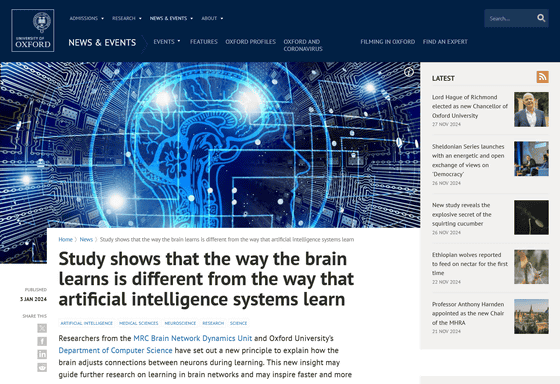The brain's learning principles are fundamentally different from those of artificial intelligence

Research from the UK's
Inferring neural activity before plasticity as a foundation for learning beyond backpropagation | Nature Neuroscience
https://www.nature.com/articles/s41593-023-01514-1
Study shows that the way the brain learns is different from the way that artificial intelligence systems learn | University of Oxford
https://www.ox.ac.uk/news/2024-01-03-study-shows-way-brain-learns-different-way-artificial-intelligence-systems-learn

When training an artificial intelligence (AI), we need to train it using the same information hundreds of times, but biological brains can learn from seeing new information just once.
The research team examined, analyzed and simulated information processing models that explain the behavior of neurons and changes in synaptic connections in the brain during learning, and found that the principles behind these models are fundamentally different from those of artificial neural networks.
In the case of artificial neural networks, external algorithms try to adjust synaptic connections to reduce errors.
However, according to the research team, in the case of the human brain, before synaptic connections are adjusted, the brain first tries to adjust the activity of neurons to an optimal balance. This adjustment is thought to be made to make learning more efficient without interfering with existing knowledge while retaining it, and the research team calls it 'prospective configuration.'

Computer simulations of models using the prospective configuration have shown that they can learn tasks that humans and animals face in the natural world more effectively than artificial neuron networks.
' For machine learning, simulating a prospective configuration on existing computers takes time because it works in a fundamentally different way from a biological brain. This requires the development of new types of computers and specialized brain-inspired hardware that can implement the prospective configuration at high speed and with almost no energy consumption,' said Yuhang Song, lead author of the paper.
Related Posts:
in Science, Posted by logc_nt







